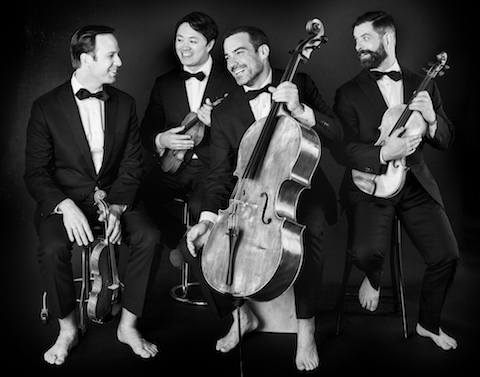

Press

By Mary Fairchild for The Boston Musical Intelligencer
The Miró Quartet returned to Maverick Concerts on Sunday with mostly familiar music and a refreshingly unfamiliar work by Pulitzer Prize-winning American composer Caroline Shaw in a concert honoring the late David F. Segal, Maverick’s former board chairman.
After some introductory remarks from Maverick personnel, the gentlemen of the Miró began with a slightly surprising cold open, as the cellist chimed softly in with the pulsing introduction of Mozart’s String Quartet No. 19, “Dissonance.” The lovely moment, a tiny mystery, almost immediately resolved, clearing the deck for an afternoon filled with lovely moments and the sunny delights of C Major.
They achieved at times an almost orchestral weight. The susurrus of the torrential rainfall surrounding the hall created an unrelenting but somehow wondrous sonic scrim behind the music. The Miró reminded us that the ideal effect of such an ensemble is to sound as if there is actually only one instrument in play. The members of the quartet constantly communicated — a smile, a glance, a lifted eyebrow. The audible effect was as if they were all playing on the same instrument. It was clear, as they offered each movement of the Mozart, that they were all doing, in every respect, exactly what they love to do.
Inspired by the Miró, American composer Caroline Shaw wrote Microfictions [Vol. 1] a collection of six miniatures, each introduced by a tiny bijoux of science-fictiony prose, each observation read by a member of the quartet. It strikes one as an exercise in where to go after strict tonality has had its day and atonality has coughed to a stop. Of dissonances there were not many, those few never quite resolved; as a rule; rather they were cleared up, and then moved on from. There was much assonance, sturdy chordal passages that allowed the quartet to support the morsels of melody—“a chord that fell from grace,” as one of the Microfictions put it. There was melody, as well, mostly in brief snippets; the text described one tune as “visible,” adding a note of synesthesia. The Miró dispatched the whole work joyfully, leaning in to the solemnity of the glorious chords, the pleasure of melodic expressions of sweetness and tongue-in-cheek sorrow.
Dvořák’s String Quartet No. 13 in G Major; written just after his stay in America, is filled with unmistakably Czech melody, harmony, and rhythm. The Miró acceded to the familiar tropes, moving effortlessly from jolly to poignant, from simple to passionate. The last movement, in particular, communicated delight of a job well done; the composer seemingly speaking through the music and its players of his joyful return from America to his beloved Bohemian homeland.